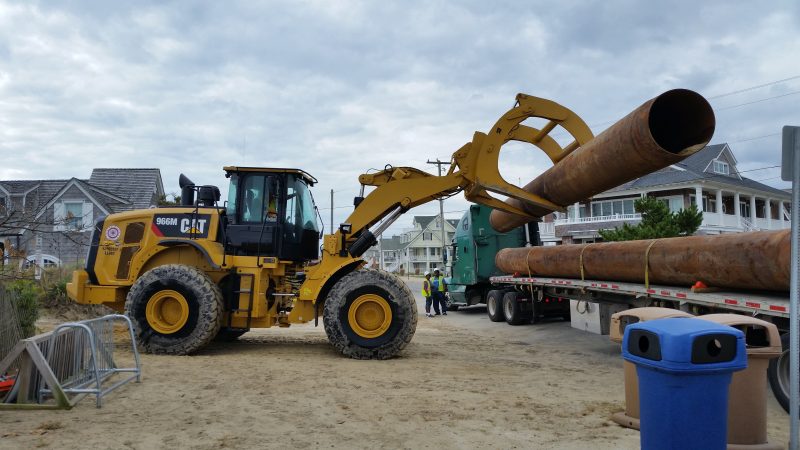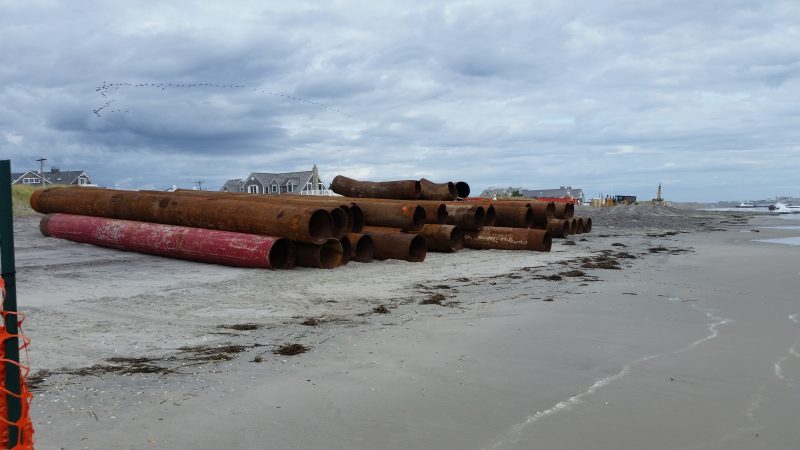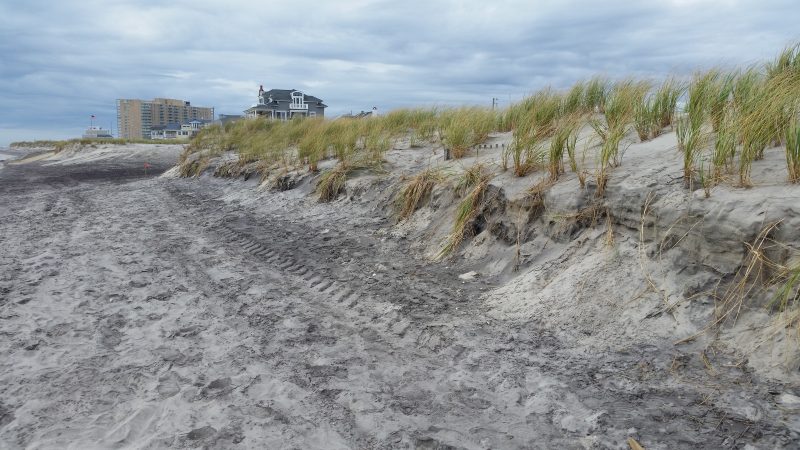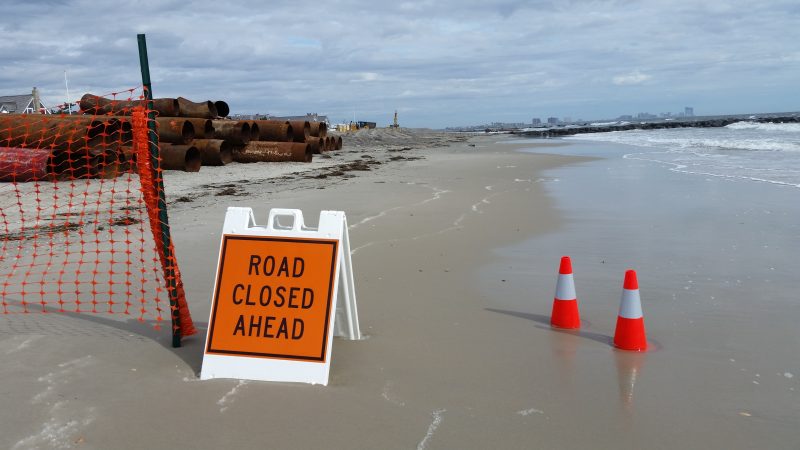A beach replenishment project in the city's north end is moving along ahead of schedule and may be completed by Christmas.
 By Donald Wittkowski
Call it the coastal cavalry.
Help for Ocean City’s eroded beaches arrived Monday in the form of giant excavators, flat-bed tractor trailers, mountainous piles of pipe and workers wearing hard hats.
Soon, they will be joined by a 305-foot dredge, named “Texas,” anchored about a mile offshore to pump fresh sand through pipes from the bottom of Great Egg Harbor Inlet onto the beaches at the barrier island’s northern tip.
After being ravaged by the seashore’s capricious storms, you might say that the north end beaches are in need of a Texas-sized repair job.
Altogether, 1.3 million cubic yards of sand will replenish the beachfront between Seaspray Road and 14th Street. In addition, sand will be stockpiled to rebuild the depleted dunes near Fifth Street and 10th Street.
The project will help the tourist-dependent city keep its beaches in tip-top shape so it may continue attracting summer vacationers to its shoreline.
By Donald Wittkowski
Call it the coastal cavalry.
Help for Ocean City’s eroded beaches arrived Monday in the form of giant excavators, flat-bed tractor trailers, mountainous piles of pipe and workers wearing hard hats.
Soon, they will be joined by a 305-foot dredge, named “Texas,” anchored about a mile offshore to pump fresh sand through pipes from the bottom of Great Egg Harbor Inlet onto the beaches at the barrier island’s northern tip.
After being ravaged by the seashore’s capricious storms, you might say that the north end beaches are in need of a Texas-sized repair job.
Altogether, 1.3 million cubic yards of sand will replenish the beachfront between Seaspray Road and 14th Street. In addition, sand will be stockpiled to rebuild the depleted dunes near Fifth Street and 10th Street.
The project will help the tourist-dependent city keep its beaches in tip-top shape so it may continue attracting summer vacationers to its shoreline.
 Enormous pipes stacked on the beach will be used to deposit fresh sand onto the eroded shoreline.
In 2016, Ocean City scored a public relations coup by being crowned the “Best Beach in America” in an online nationwide poll conducted by Coastal Living Magazine. Ocean City has also been selected as New Jersey’s “best beach” for four years in a row.
Besides the aesthetic value of having wide, powdery beaches, the city will also benefit from the replenishment project by having a bigger barrier of sand and dunes to protect homes, businesses, the Boardwalk and roads from the ocean’s storm surge.
“These projects are absolutely vital to the protection of property in Ocean City,” Mayor Jay Gillian pointed out.
At the same time the beaches are being restored, the city is giving the Boardwalk a $2.9 million facelift from 10th to 12th
Enormous pipes stacked on the beach will be used to deposit fresh sand onto the eroded shoreline.
In 2016, Ocean City scored a public relations coup by being crowned the “Best Beach in America” in an online nationwide poll conducted by Coastal Living Magazine. Ocean City has also been selected as New Jersey’s “best beach” for four years in a row.
Besides the aesthetic value of having wide, powdery beaches, the city will also benefit from the replenishment project by having a bigger barrier of sand and dunes to protect homes, businesses, the Boardwalk and roads from the ocean’s storm surge.
“These projects are absolutely vital to the protection of property in Ocean City,” Mayor Jay Gillian pointed out.
At the same time the beaches are being restored, the city is giving the Boardwalk a $2.9 million facelift from 10th to 12th Large chunks of sand have been carved from the north end dunes, creating cliff-like drop-offs.
The city is teaming up with the U.S. Army Corps of Engineers and the New Jersey Department of Environmental Protection for the $13.4 million beach replenishment project. The federal government will pay for 65 percent of the cost.
The state picks up the remaining 35 percent. However, Ocean City will pay 25 percent of the state’s share, or 8.75 percent of the project’s total cost, according to the city’s website. That works out to about $1.2 million for the city’s portion.
The north end beaches were last replenished in 2015, when the Army Corps of Engineers pumped 1 million cubic yards of new sand between the northernmost jetty at Seaspray Road and 12th Street at a cost of $12.3 million. Ocean City’s share of that project was about $1.1 million.
The city is now on a regular three-year cycle for beach replenishment projects funded by the Army Corps of Engineers. Although the next phase of pumping was originally scheduled for 2018, the timetable was accelerated after the city was successful in its talks to get the north end beaches replenished this fall.
“I’m grateful for our partnership with the federal Army Corps of Engineers and the state Department of Environmental Protection,” Gillian said.
Some of the north end beaches got hammered by the powerful coastal storm Jonas in January 2016. In addition to carving sharp, cliff-like drop-offs in the dunes, the storm also washed away the top layer of powdery sand that provides a comfortable cushion for beachgoers to lie on.
“These projects are all designed to repair storm damage,” said Steve Rochette, a spokesman for the Army Corps of Engineers who also explained that the beach replenishment work will provide extra protection in future storms.
Large chunks of sand have been carved from the north end dunes, creating cliff-like drop-offs.
The city is teaming up with the U.S. Army Corps of Engineers and the New Jersey Department of Environmental Protection for the $13.4 million beach replenishment project. The federal government will pay for 65 percent of the cost.
The state picks up the remaining 35 percent. However, Ocean City will pay 25 percent of the state’s share, or 8.75 percent of the project’s total cost, according to the city’s website. That works out to about $1.2 million for the city’s portion.
The north end beaches were last replenished in 2015, when the Army Corps of Engineers pumped 1 million cubic yards of new sand between the northernmost jetty at Seaspray Road and 12th Street at a cost of $12.3 million. Ocean City’s share of that project was about $1.1 million.
The city is now on a regular three-year cycle for beach replenishment projects funded by the Army Corps of Engineers. Although the next phase of pumping was originally scheduled for 2018, the timetable was accelerated after the city was successful in its talks to get the north end beaches replenished this fall.
“I’m grateful for our partnership with the federal Army Corps of Engineers and the state Department of Environmental Protection,” Gillian said.
Some of the north end beaches got hammered by the powerful coastal storm Jonas in January 2016. In addition to carving sharp, cliff-like drop-offs in the dunes, the storm also washed away the top layer of powdery sand that provides a comfortable cushion for beachgoers to lie on.
“These projects are all designed to repair storm damage,” said Steve Rochette, a spokesman for the Army Corps of Engineers who also explained that the beach replenishment work will provide extra protection in future storms.
 A mesh fence, a sign and cones have been placed at water's edge on North Street to warn beachgoers from entering the construction zone.
The beach restoration work will be done by federal contractor Great Lakes Dredge & Dock Co. of Oak Brook, Illinois. The company began setting up its equipment and massive pipes on Monday at a staging area on Morningside Road’s beachfront.
The project is scheduled to be completed in February, Rochette said. Beach replenishment will first be done north of Morningside Road and then will turn south. A 1,000-foot work zone will be established along the beach for safety. “Road Closed Ahead” signs and a mesh fence have already been erected on the street and beach to keep people out.
Originally, the project called for 930,000 cubic yards of new sand for the north end beaches, but the amount was increased to 1.3 million cubic yards after a preconstruction survey was conducted, Rochette said.
“This is just a case of needing more sand to reach our template,” he said of the Army Corps of Engineers.
With an extra 400,000 cubic yards of sand being added, the cost of the project increased from the original price tag of $11.5 million to $13.4 million. The costs associated with mobilizing the offshore sand dredge and other equipment also added to the project’s overall price tag, according to Rochette.
While the work is concentrating on the north end beaches now, the city’s southern tip remains on schedule for another replenishment project sometime in late 2018 or early 2019.
In 2016, the south end received 473,000 cubic yards of new sand to restore the storm-damaged beaches between 37th and 59th streets. The work was part of a federally funded $15.8 million project that also replenished beaches in Sea Isle City and Strathmere.
A mesh fence, a sign and cones have been placed at water's edge on North Street to warn beachgoers from entering the construction zone.
The beach restoration work will be done by federal contractor Great Lakes Dredge & Dock Co. of Oak Brook, Illinois. The company began setting up its equipment and massive pipes on Monday at a staging area on Morningside Road’s beachfront.
The project is scheduled to be completed in February, Rochette said. Beach replenishment will first be done north of Morningside Road and then will turn south. A 1,000-foot work zone will be established along the beach for safety. “Road Closed Ahead” signs and a mesh fence have already been erected on the street and beach to keep people out.
Originally, the project called for 930,000 cubic yards of new sand for the north end beaches, but the amount was increased to 1.3 million cubic yards after a preconstruction survey was conducted, Rochette said.
“This is just a case of needing more sand to reach our template,” he said of the Army Corps of Engineers.
With an extra 400,000 cubic yards of sand being added, the cost of the project increased from the original price tag of $11.5 million to $13.4 million. The costs associated with mobilizing the offshore sand dredge and other equipment also added to the project’s overall price tag, according to Rochette.
While the work is concentrating on the north end beaches now, the city’s southern tip remains on schedule for another replenishment project sometime in late 2018 or early 2019.
In 2016, the south end received 473,000 cubic yards of new sand to restore the storm-damaged beaches between 37th and 59th streets. The work was part of a federally funded $15.8 million project that also replenished beaches in Sea Isle City and Strathmere.